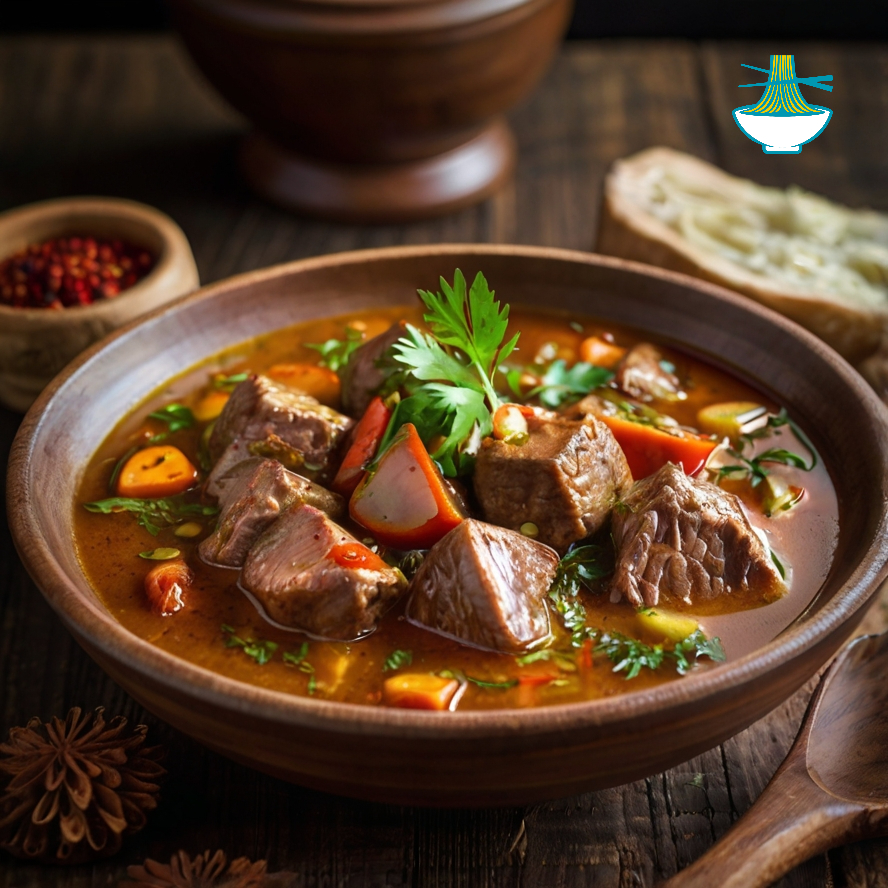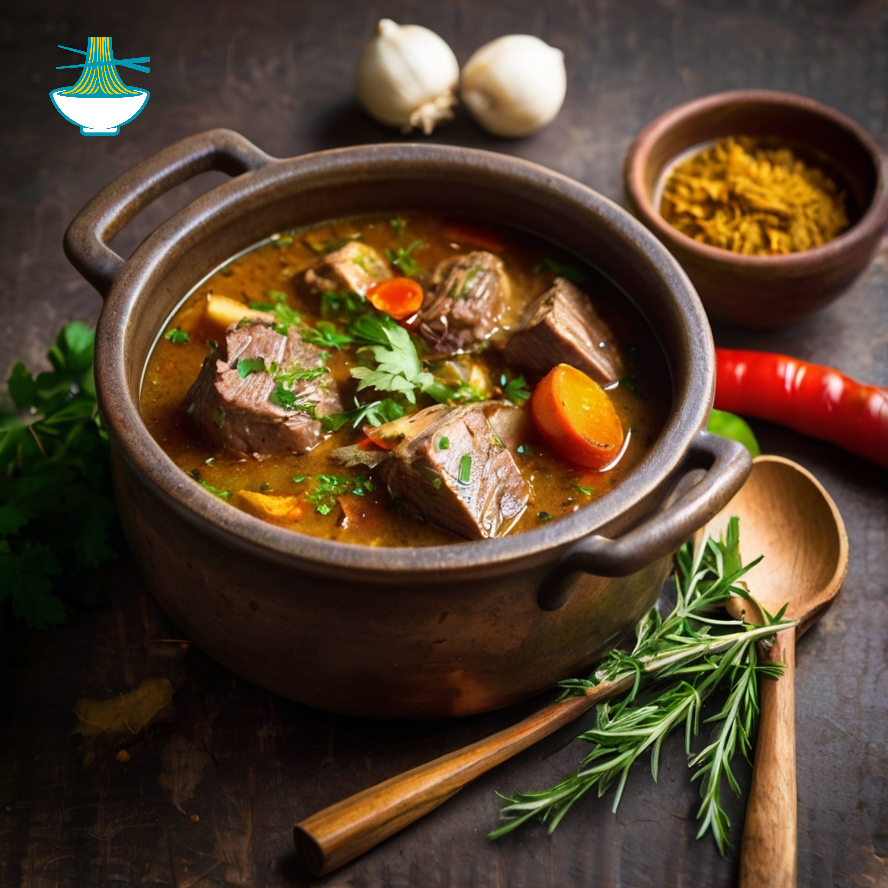Tok-chaa, a flavorful meat stew, originates from the vibrant culinary traditions of Southeast Asia. This dish boasts a rich history rooted in the diverse cultural influences of the region. Comprising tender meat simmered in a fragrant blend of indigenous herbs and spices, Tok-chaa embodies the essence of comfort and nourishment. With each spoonful, diners are transported to a culinary journey that celebrates the ingenuity of local ingredients and the artistry of traditional cooking techniques. This beloved recipe has stood the test of time, evolving over generations to become a beloved staple in households across Southeast Asia and beyond.
Ingredients:
- 500g of meat (chicken, beef, or pork), diced
- 2 tablespoons vegetable oil
- 3 cloves garlic, minced
- 1 onion, chopped
- 1 teaspoon ginger, grated
- 2 tomatoes, diced
- 2 potatoes, peeled and cubed
- 2 carrots, peeled and sliced
- 2 cups water or broth
- Salt and pepper to taste
- 2 tablespoons soy sauce
- 1 tablespoon fish sauce (optional)
- Fresh herbs (such as cilantro or basil) for garnish
Method:
1. Heat vegetable oil in a large pot over medium heat. Add minced garlic, chopped onion, and grated ginger. Sauté until fragrant, about 2 minutes.
2. Add diced meat to the pot and cook until browned on all sides.
3. Stir in diced tomatoes and cook for another 2-3 minutes.
4. Add cubed potatoes and sliced carrots to the pot. Pour in water or broth until the ingredients are just covered.
5. Season with salt, pepper, soy sauce, and fish sauce (if using). Stir well to combine.
6. Bring the stew to a boil, then reduce the heat to low. Cover and simmer for about 30-40 minutes, or until the meat is tender and the vegetables are cooked through.
7. Taste and adjust seasoning if necessary.
8. Serve hot, garnished with fresh herbs.
This uncomplicated recipe delivers a delicious and satisfying Tok-chaa stew that can be enjoyed with rice or bread for a comforting meal.
Nutrition Value:
1. Meat (500g):
- Calories: Depending on the type of meat (chicken, beef, or pork), approximately 700-1100 calories.
- Carbohydrates: Negligible.
- Protein: Approximately 75-100g.
- Fat: Approximately 35-75g, depending on the type and cut of meat.
- Sodium: Varies depending on preparation and seasoning.
- Cholesterol: Varies depending on the type of meat, but generally around 200-300mg.
- Vitamins and Minerals: Rich in B vitamins (especially B12), zinc, selenium, and iron.
- Nutritional Benefit: High-quality protein source, essential for muscle repair and growth. Rich in iron and zinc, important for immune function and overall health.
2. Vegetable Oil (2 tablespoons):
- Calories: Approximately 240 calories.
- Carbohydrates: Negligible.
- Protein: Negligible.
- Fat: Approximately 28g (mostly unsaturated fats).
- Sodium: Negligible.
- Cholesterol: Negligible.
- Vitamins and Minerals: Contains vitamin E, an antioxidant.
- Nutritional Benefit: Provides healthy fats essential for brain function and vitamin absorption.
3. Garlic (3 cloves, minced):
- Calories: Approximately 15 calories.
- Carbohydrates: Approximately 3g.
- Protein: Approximately 1g.
- Fat: Negligible.
- Sodium: Negligible.
- Cholesterol: Negligible.
- Vitamins and Minerals: High in vitamin C, vitamin B6, manganese, and selenium.
- Nutritional Benefit: Contains compounds with potential health benefits, including immune-boosting and antimicrobial properties.
4. Onion (1 onion, chopped):
- Calories: Approximately 45 calories.
- Carbohydrates: Approximately 11g.
- Protein: Approximately 1g.
- Fat: Negligible.
- Sodium: Negligible.
- Cholesterol: Negligible.
- Vitamins and Minerals: Rich in vitamin C, vitamin B6, potassium, and folate.
- Nutritional Benefit: Contains antioxidants and compounds that may support heart health and immune function.
5. Ginger (1 teaspoon, grated):
- Calories: Approximately 5 calories.
- Carbohydrates: Approximately 1g.
- Protein: Negligible.
- Fat: Negligible.
- Sodium: Negligible.
- Cholesterol: Negligible.
- Vitamins and Minerals: Contains gingerol, a bioactive compound with antioxidant and anti-inflammatory properties. Also a good source of vitamin B6 and manganese.
- Nutritional Benefit: Known for its digestive and anti-inflammatory properties. May help alleviate nausea and support immune function.
6. Tomatoes (2 tomatoes, diced):
- Calories: Approximately 50 calories.
- Carbohydrates: Approximately 10g.
- Protein: Approximately 2g.
- Fat: Negligible.
- Sodium: Approximately 10mg.
- Cholesterol: Negligible.
- Vitamins and Minerals: Rich in vitamin C, vitamin K, potassium, and folate.
- Nutritional Benefit: Excellent source of antioxidants, particularly lycopene, which may reduce the risk of certain diseases such as cancer and heart disease.
7. Potatoes (2 potatoes, peeled and cubed):
- Calories: Approximately 220 calories.
- Carbohydrates: Approximately 50g.
- Protein: Approximately 5g.
- Fat: Negligible.
- Sodium: Approximately 20mg.
- Cholesterol: Negligible.
- Vitamins and Minerals: High in vitamin C, potassium, vitamin B6, and manganese.
- Nutritional Benefit: Good source of energy-providing carbohydrates and potassium, essential for nerve and muscle function.
8. Carrots (2 carrots, peeled and sliced):
- Calories: Approximately 50 calories.
- Carbohydrates: Approximately 12g.
- Protein: Approximately 1g.
- Fat: Negligible.
- Sodium: Approximately 50mg.
- Cholesterol: Negligible.
- Vitamins and Minerals: Rich in beta-carotene (which the body converts to vitamin A), vitamin K, potassium, and fiber.
- Nutritional Benefit: Supports eye health, immune function, and may reduce the risk of certain chronic diseases.
9. Water or Broth (2 cups):
- Calories: Approximately 0 calories for water; varies for broth.
- Carbohydrates: Negligible.
- Protein: Negligible.
- Fat: Negligible.
- Sodium: Varies depending on the type and amount of broth used.
- Cholesterol: Negligible.
- Vitamins and Minerals: Depends on the type of broth used.
- Nutritional Benefit: Hydration for the body; broth may add flavor and nutrients such as protein, vitamins, and minerals.
10. Soy Sauce (2 tablespoons):
- Calories: Approximately 20 calories.
- Carbohydrates: Approximately 4g.
- Protein: Approximately 2g.
- Fat: Negligible.
- Sodium: Approximately 2000mg.
- Cholesterol: Negligible.
- Vitamins and Minerals: Contains small amounts of iron and potassium.
- Nutritional Benefit: Adds flavor and umami to the dish but should be used in moderation due to its high sodium content.
11. Fish Sauce (1 tablespoon, optional):
- Calories: Approximately 10 calories.
- Carbohydrates: Negligible.
- Protein: Approximately 2g.
- Fat: Negligible.
- Sodium: Approximately 1000mg.
- Cholesterol: Negligible.
- Vitamins and Minerals: Contains small amounts of calcium and phosphorus.
- Nutritional Benefit: Adds a savory depth of flavor; provides umami taste.
12. Fresh Herbs (such as cilantro or basil) for garnish:
- Calories: Negligible.
- Carbohydrates: Negligible.
- Protein: Negligible.
- Fat: Negligible.
- Sodium: Negligible.
- Cholesterol: Negligible.
- Vitamins and Minerals: Contains various vitamins and minerals depending on the herb used.
- Nutritional Benefit: Adds freshness, aroma, and small amounts of vitamins and minerals to the dish.
These nutritional values are approximate and can vary based on factors such as cooking methods, portion sizes, and specific ingredient brands.


Comments